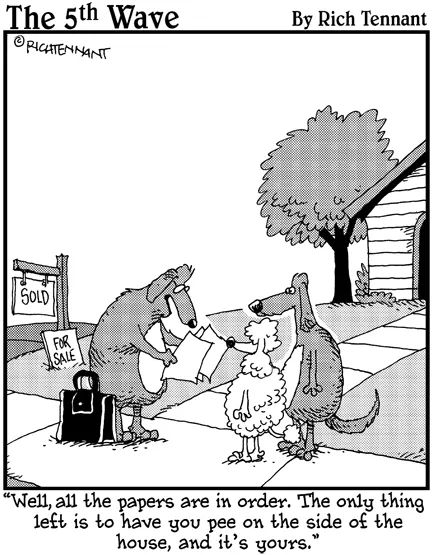Part I
Introducing Property Law
In this part . . .
Property law is about the legal rights that come with owning things. In this part, I help you think about what property is and introduce the types of laws that shape property rights. You find out about the basic rights that come with property ownership, how private agreements and public laws can change those rights, and the legal remedies that courts can give you when your rights are invaded. You also get an overview of how property rights are acquired, transferred, shared, and divided over time.
Chapter 1
Getting the Lowdown on Property Law
In This Chapter
Introducing ways of sharing ownership simultaneously or over time
Looking at ways of acquiring and transferring property
Property law is the law about property. Okay, that’s probably not helpful, but I have to start the book somehow.
Maybe it’s not that helpful, but it’s true. Because property law is law about property, understanding what property law is requires understanding what property is. In this chapter, I explain the types of legal rights that constitute property and what the two big categories of property — real and personal — include.
I also describe the ways that ownership may be shared and divided up over time, and I identify ways people may become property owners and transfer their ownership to other people.
Defining Property
Because property law is simply all types of laws about property, describing property law requires defining property. That’s the organizing principle, the common denominator, for law school courses about property law and for this book. The following sections explain how property means having certain types of legal rights in relation to a thing and introduce the two main types of property.
Viewing property as legal rights
Property may refer to things that people own, but from a legal perspective, thinking of property as legal rights in relation to things is more accurate. A legal right is essentially a right that a court will recognize and enforce. (
Chapter 2 introduces the ways that courts enforce property rights.)
Although you can be much more specific about the legal rights that constitute property, all property rights fit in four basic categories:
Rights to possess: The owner of land has the right to occupy it. The owner of other kinds of property has the right to physically control it.
Rights to use: The owner of property can use it in all sorts of ways. Of course, the right to use can’t be absolute because one person’s use of her property may interfere with others’ use of their property.
Rights to exclude others: An owner can keep others from using or invading her property.
Rights to transfer: An owner can transfer her legal rights in whole or in part to other people.
None of these rights are absolute; they’re simply categories and types of legal rights that constitute property ownership. But owning property means having these four rights to some extent.
The extent of these rights for any particular owner depends on the combined effect of all the sources of legal rights and rules. Specific property rights are determined by the following:
Common law: The common law describes traditional property rights that constitute property ownership, created and shaped by judicial decisions over time.
Chapter 4 talks about some of the main common-law property rights.
Rights created by contract: Property owners can adjust their rights by private agreement with others. Under the common law, for example, a property owner has the right to exclude others from entering her land, but she can contractually give another person the property right to enter her land. Such rights are called
easements, which I discuss in
Chapter 6. Similarly, the common ...












